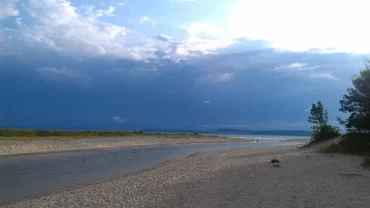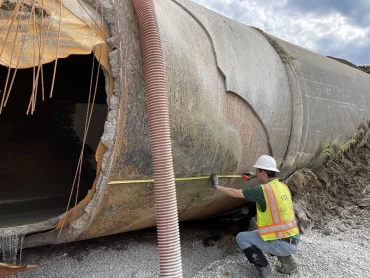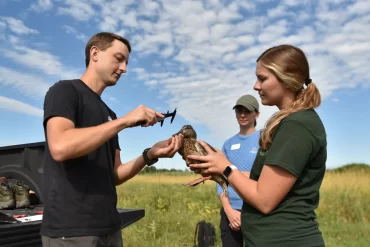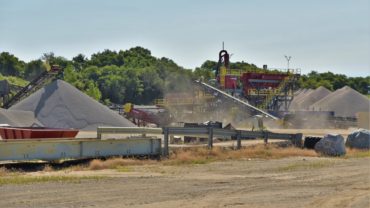-
 Charles Stewart Mott Foundation PartnershipEnbridge Line 5 and Other PipelinesEnergy, Clean Energy, Ethanol and FrackingFeature HomepageIndigenous CommunitiesIndustry, Energy, Economic DevelopmentLake SuperiorLatest NewsMichiganNewsOntario
Charles Stewart Mott Foundation PartnershipEnbridge Line 5 and Other PipelinesEnergy, Clean Energy, Ethanol and FrackingFeature HomepageIndigenous CommunitiesIndustry, Energy, Economic DevelopmentLake SuperiorLatest NewsMichiganNewsOntarioJudge refuses to shut down Line 5, but says Enbridge is trespassing on Native American reservation
-The Bad River Band of Lake Superior Chippewa wanted Line 5 shut down and moved off its land.
02 -
 Charles Stewart Mott Foundation PartnershipCollaborationEnbridge Line 5 and Other PipelinesEnergy, Clean Energy, Ethanol and FrackingIndustry, Energy, Economic DevelopmentLatest NewsMichiganNewsOntarioPolitics, Policy, Environmental JusticeWater Quality and Restoration Efforts
Charles Stewart Mott Foundation PartnershipCollaborationEnbridge Line 5 and Other PipelinesEnergy, Clean Energy, Ethanol and FrackingIndustry, Energy, Economic DevelopmentLatest NewsMichiganNewsOntarioPolitics, Policy, Environmental JusticeWater Quality and Restoration EffortsSupporters and opponents of a Line 5 tunnel make comments to U.S. Army Corps of Engineers
-The U.S. Army Corps of Engineers (USACE) is ready to review the environmental impacts of a proposed tunnel under the Straits of Mackinac.
-
 Charles Stewart Mott Foundation PartnershipCollaborationLake MichiganLatest NewsMichiganNewsRecreation and TourismScience, Technology, ResearchTourismWater Quality and Restoration Efforts
Charles Stewart Mott Foundation PartnershipCollaborationLake MichiganLatest NewsMichiganNewsRecreation and TourismScience, Technology, ResearchTourismWater Quality and Restoration EffortsPark service investigates sudden change in river flow at Sleeping Bear Dunes
-The National Park Service is investigating a sudden change in the flow of the Platte River at Sleeping Bear Dunes National Lakeshore.
-
 Charles Stewart Mott Foundation PartnershipDrinking WaterIndustry, Energy, Economic DevelopmentLatest NewsMichiganNewsWater Quality and Restoration Efforts
Charles Stewart Mott Foundation PartnershipDrinking WaterIndustry, Energy, Economic DevelopmentLatest NewsMichiganNewsWater Quality and Restoration EffortsSE Michigan Water main break larger than thought; boil water advisories expected until September
-The weekend break disrupted water service for hundreds of thousands of Michiganders.
-
 Charles Stewart Mott Foundation PartnershipFeature HomepageFish, Birds and AnimalsHabitat RestorationIllinoisIndianaLatest NewsMichiganNewsOhioPolitics, Policy, Environmental JusticeProtectResearch, Data and TechnologyScience, Technology, ResearchWater Quality and Restoration EffortsWisconsin
Charles Stewart Mott Foundation PartnershipFeature HomepageFish, Birds and AnimalsHabitat RestorationIllinoisIndianaLatest NewsMichiganNewsOhioPolitics, Policy, Environmental JusticeProtectResearch, Data and TechnologyScience, Technology, ResearchWater Quality and Restoration EffortsWisconsinWhy are mallard duck populations falling in the Great Lakes region?
-Mallard duck populations are down about 16 to 17 percent since the early 2000s. New technology might help determine why.
-
 Charles Stewart Mott Foundation PartnershipIndustry, Energy, Economic DevelopmentInfrastructureLatest NewsMichiganMunicipalitiesNewsPolitics, Policy, Environmental JusticeThe StatesWater Quality and Restoration Efforts
Charles Stewart Mott Foundation PartnershipIndustry, Energy, Economic DevelopmentInfrastructureLatest NewsMichiganMunicipalitiesNewsPolitics, Policy, Environmental JusticeThe StatesWater Quality and Restoration EffortsState lawmakers consider taking away local authority to issue gravel mining permits
-Legislation before the Michigan House would remove permitting authority from municipalities and give it to EGLE.
-
 AgricultureAlgae BloomsCharles Stewart Mott Foundation PartnershipIndustry, Energy, Economic DevelopmentLake ErieLatest NewsMichiganNewsOhioWater Quality and Restoration Efforts
AgricultureAlgae BloomsCharles Stewart Mott Foundation PartnershipIndustry, Energy, Economic DevelopmentLake ErieLatest NewsMichiganNewsOhioWater Quality and Restoration EffortsWill Michigan farmers voluntarily help reduce phosphorus loading into Lake Erie?
-Public pressure is growing over toxic cyanobacteria blooms growing in the western basin of Lake Erie and other places in Michigan.
-

New web scanning technology helps protect the Great Lakes from invasive species
-Great Lakes officials are using tech to scan the web for businesses selling invasive species. The Great Lakes Commission is testing a web-crawler that scans for websites selling invasive species that could harm the Great Lakes.
-
 ArticleClimate ChangeFish, Birds and AnimalsIndustry, Energy, Economic DevelopmentInvasive SpeciesMichiganNewsPolicyThe States
ArticleClimate ChangeFish, Birds and AnimalsIndustry, Energy, Economic DevelopmentInvasive SpeciesMichiganNewsPolicyThe StatesNOAA doubles five-year grant to $53 million for Great Lakes researchers at University of Michigan
-The University of Michigan is getting $53 million from the National Oceanic and Atmospheric Administration to further study the Great Lakes. That doubles the amount of research money available. The federal grant will be released over a five-year period.
-
 BudgetCharles Stewart Mott Foundation PartnershipCollaborationDrinking WaterEquity and Environmental JusticeInfrastructureLatest NewsMichiganNewsPolitics, Policy, Environmental JusticeWater Quality and Restoration Efforts
BudgetCharles Stewart Mott Foundation PartnershipCollaborationDrinking WaterEquity and Environmental JusticeInfrastructureLatest NewsMichiganNewsPolitics, Policy, Environmental JusticeWater Quality and Restoration EffortsNew laws make it easier for communities to access state financing for water infrastructure
-Bipartisan legislation to help cities get money to fix their water systems has been signed by Michigan Gov. Gretchen Whitmer.

